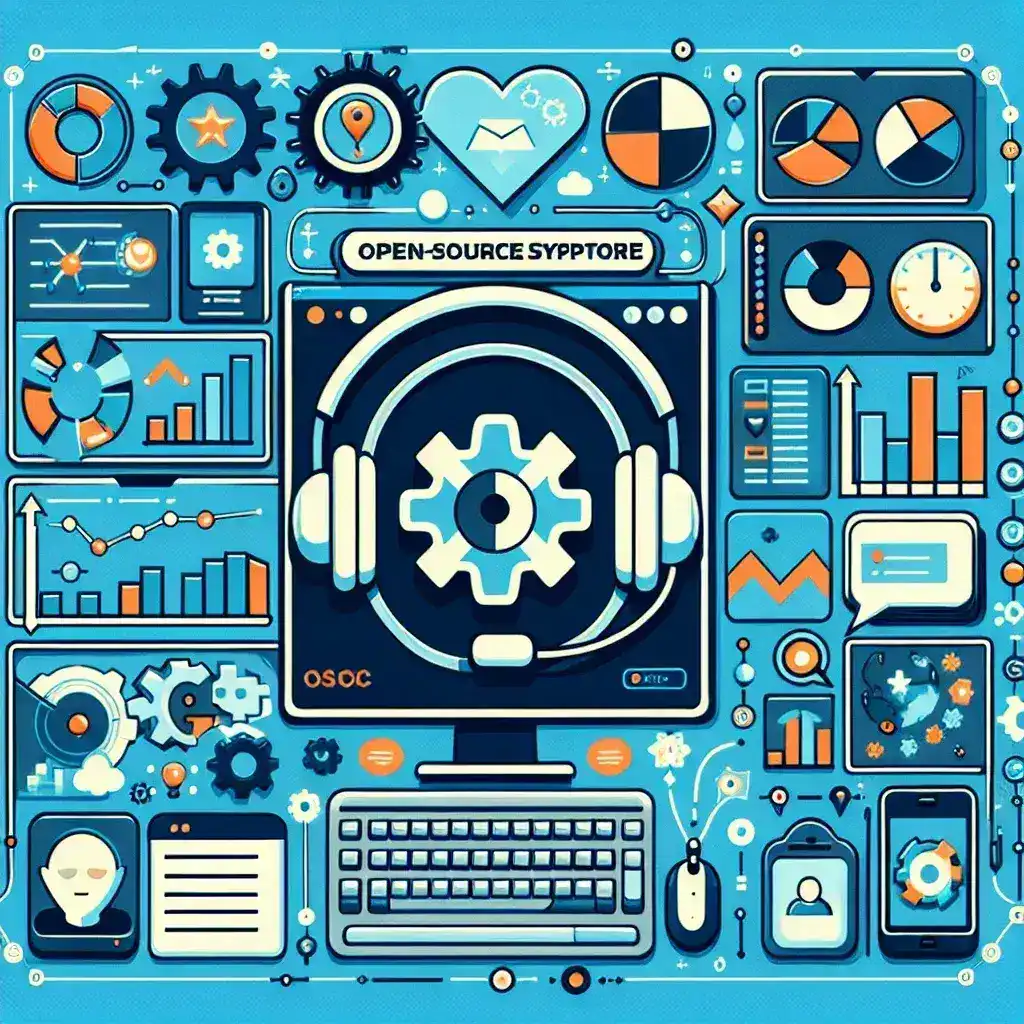In today’s competitive business landscape, exceptional customer support has become a cornerstone of success. Organizations worldwide are increasingly turning to open-source ticketing systems as cost-effective alternatives to expensive proprietary solutions. These powerful platforms offer robust functionality without the hefty price tag, making professional customer service accessible to businesses of all sizes.
Understanding Open-Source Ticketing Systems
Open-source ticketing systems represent a revolutionary approach to customer support management. Unlike traditional closed-source solutions, these platforms provide complete access to source code, enabling organizations to customize, modify, and enhance the software according to their specific requirements. This transparency fosters innovation and ensures that businesses aren’t locked into vendor-specific ecosystems.
The fundamental principle behind open-source ticketing systems lies in community-driven development. Thousands of developers worldwide contribute to these projects, continuously improving functionality, security, and user experience. This collaborative approach results in robust, feature-rich platforms that often surpass their commercial counterparts in terms of flexibility and innovation.
Key Features and Capabilities
Modern open-source ticketing systems offer comprehensive feature sets that rival expensive enterprise solutions. Ticket management forms the core functionality, allowing support teams to efficiently track, prioritize, and resolve customer inquiries. Advanced workflow automation reduces manual intervention, enabling agents to focus on complex issues requiring human expertise.
Essential Features Include:
- Multi-channel ticket creation (email, web forms, phone, social media)
- Automated ticket routing and assignment
- Customizable priority levels and SLA management
- Knowledge base integration
- Reporting and analytics dashboards
- Customer portal for self-service
- Mobile-responsive interfaces
- API integration capabilities
These systems excel in providing scalability and flexibility. Organizations can start with basic configurations and gradually expand functionality as their support requirements evolve. The modular architecture of most open-source solutions allows for seamless integration with existing business systems, creating unified customer experience platforms.
Top Open-Source Ticketing Solutions
osTicket
osTicket stands as one of the most popular open-source ticketing systems, serving millions of users worldwide. This PHP-based platform offers intuitive ticket management, customizable workflows, and extensive plugin support. Its user-friendly interface makes it ideal for organizations transitioning from manual support processes to automated systems.
Zammad
Zammad represents the next generation of open-source helpdesk solutions, combining modern design with powerful functionality. Built with Ruby on Rails, it offers real-time collaboration features, advanced search capabilities, and seamless integration with popular business tools. The platform’s emphasis on user experience makes it particularly attractive to forward-thinking organizations.
OTRS (OTOBO)
OTRS, now evolved into OTOBO, provides enterprise-grade ticketing functionality with extensive customization options. This Perl-based system excels in complex environments requiring sophisticated workflow management and reporting capabilities. Its robust architecture supports high-volume operations while maintaining performance standards.
FreeScout
FreeScout offers a compelling alternative to expensive SaaS solutions like Help Scout. This Laravel-based platform provides clean, intuitive interfaces with essential ticketing features. Its focus on simplicity and ease of use makes it perfect for small to medium-sized businesses seeking professional support capabilities without complexity.
Implementation Strategies and Best Practices
Successful implementation of open-source ticketing systems requires careful planning and strategic approach. Organizations should begin by conducting thorough needs assessments, identifying specific requirements, and evaluating existing infrastructure capabilities. This preliminary analysis ensures optimal platform selection and configuration.
Technical Considerations
Infrastructure planning plays a crucial role in implementation success. Organizations must evaluate server requirements, database specifications, and security protocols. Most open-source ticketing systems require standard LAMP or LEMP stack configurations, making them accessible to organizations with basic technical capabilities.
Security implementation deserves special attention when deploying open-source solutions. While these platforms benefit from community security audits, organizations remain responsible for proper configuration, regular updates, and access control management. Implementing SSL certificates, regular backups, and monitoring systems ensures robust security postures.
Change Management
Transitioning to new ticketing systems requires comprehensive change management strategies. Staff training programs should cover both technical aspects and process modifications. Creating detailed documentation, establishing support procedures, and developing escalation protocols ensures smooth transitions and user adoption.
Cost-Benefit Analysis
The financial advantages of open-source ticketing systems extend far beyond initial licensing savings. Organizations typically experience significant reductions in total cost of ownership compared to proprietary alternatives. These savings stem from eliminated licensing fees, reduced vendor lock-in risks, and increased customization capabilities.
However, organizations must consider implementation and maintenance costs. While software licensing is free, expenses may include server infrastructure, technical support, customization development, and staff training. Despite these considerations, most organizations realize substantial savings within the first year of implementation.
Return on Investment
Open-source ticketing systems typically deliver impressive ROI through improved efficiency, reduced response times, and enhanced customer satisfaction. Automated workflows reduce manual processing time, while comprehensive reporting enables data-driven optimization. These improvements often translate to measurable business value through increased customer retention and reduced support costs.
Integration and Customization Opportunities
One of the most compelling advantages of open-source ticketing systems lies in their integration capabilities. Modern platforms offer extensive API support, enabling seamless connections with CRM systems, billing platforms, monitoring tools, and communication channels. This connectivity creates unified customer experience ecosystems that provide comprehensive service delivery.
Customization possibilities are virtually limitless with open-source solutions. Organizations can modify interfaces, create custom fields, develop specialized workflows, and integrate proprietary business logic. This flexibility ensures that ticketing systems align perfectly with existing business processes rather than forcing process modifications to accommodate software limitations.
Community Support and Development
The vibrant communities surrounding open-source ticketing systems provide invaluable resources for implementation and ongoing support. Active forums, documentation wikis, and developer networks offer assistance for technical challenges, feature requests, and best practice sharing. This community-driven support often surpasses commercial vendor support in terms of responsiveness and expertise depth.
Continuous development cycles ensure that open-source platforms remain current with evolving business requirements and technological advances. Regular updates introduce new features, security improvements, and performance optimizations. Organizations benefit from these enhancements without additional licensing costs or vendor negotiations.
Security and Compliance Considerations
Modern open-source ticketing systems incorporate robust security frameworks designed to protect sensitive customer data and ensure regulatory compliance. Features like role-based access control, audit trails, and data encryption provide comprehensive protection against security threats and privacy violations.
Compliance with regulations such as GDPR, HIPAA, and SOX requires careful configuration and ongoing management. Open-source platforms often provide better compliance capabilities than proprietary solutions due to their transparency and customization possibilities. Organizations can implement specific controls, modify data handling procedures, and ensure complete audit trail maintenance.
Future Trends and Evolution
The future of open-source ticketing systems appears increasingly bright as organizations prioritize digital transformation and cost optimization. Emerging trends include artificial intelligence integration, advanced automation capabilities, and enhanced mobile experiences. These developments promise to further improve efficiency and customer satisfaction while maintaining the cost advantages that make open-source solutions attractive.
Cloud-native architectures are becoming standard, enabling easier deployment, scaling, and maintenance. Containerization technologies like Docker and Kubernetes simplify infrastructure management while providing improved reliability and performance. These technological advances make open-source ticketing systems more accessible to organizations with limited technical resources.
Conclusion
Open-source ticketing systems represent a powerful solution for organizations seeking professional customer support capabilities without the financial burden of expensive proprietary alternatives. These platforms offer comprehensive functionality, extensive customization options, and vibrant community support that often exceeds commercial offerings.
Success with open-source ticketing systems requires careful planning, proper implementation, and ongoing commitment to maintenance and optimization. Organizations that invest in these platforms typically realize significant returns through improved efficiency, reduced costs, and enhanced customer satisfaction. As the open-source ecosystem continues to evolve, these solutions will undoubtedly become even more compelling alternatives to traditional commercial platforms.
The decision to implement open-source ticketing systems should be based on thorough evaluation of organizational requirements, technical capabilities, and long-term strategic objectives. With proper planning and execution, these platforms can transform customer support operations while delivering substantial value to businesses of all sizes.





